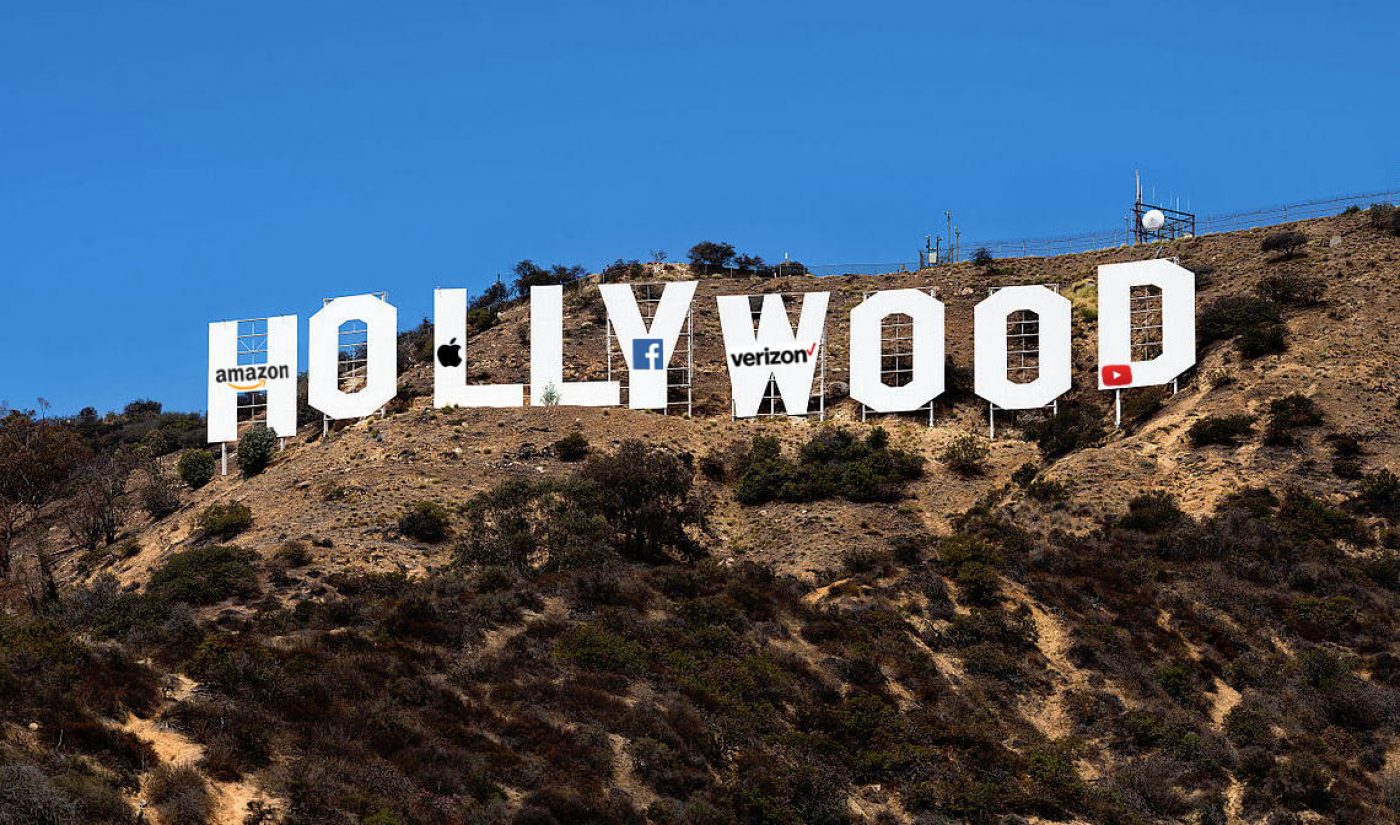Insights is a new weekly series featuring entertainment industry veteran David Bloom. It represents an experiment of sorts in digital-age journalism and audience engagement with a focus on the intersection of entertainment and technology, an area that David has written about and thought about and been part of in various career incarnations for much of the past 25 years. David welcomes your thoughts, perspectives, calumnies, and kudos at david@tubefilter.com, or on Twitter @DavidBloom.
This installment of Insights is brought to you by Beachfront RISE. 
News that Time Warner has bought a 10% stake in Hulu for $583 million, but no seat on the board, created a bit of a tizzy in streaming-media circles these past several days. While it’s notable that Time Warner is making yet another significant investment in yet another corner of the online-media universe, that’s not even this sector’s most fascinating news of the past month.

Subscribe for daily Tubefilter Top Stories
Just consider these developments, all more telling about the future of entertainment to my mind than the Time Warner – Hulu deal, loaded as it is with Hulu’s complicated management structure, owner ambivalences, and eternally shifting business plan:
- Alphabet/Google/YouTube is venturing into original programming in a big way, as first announced at VidCon, where it trumpeted a series with Channing Tatum and Jenna Dewan Tatum, based on the Step Up dance movies. At last week’s Television Critics Association meetings, YouTube was a notable addition to the usual parade of network programming presentations. At the TCAs, YouTube showed off its YouTube Space LA production facility and shows such as Vlogumentary from documentary star Morgan Spurlock; Foursome from AwesomenessTV featuring Jenn McAllister (aka JennXPenn); Single By 30 with Wong Fu’s Wesley Chan and Philip Chang; and Rhett & Link’s Buddy System, featuring the eponymous social-media stars. Subscription VOD service YouTube Red also just announced originals from Rooster Teeth, Logan Paul, and Eva Gutowski.
- After a spectacular quarter ($30.4 billion in revenue, up 31.1% year over year), Amazon said it would double spending on original entertainment for Amazon Prime. The company is chasing Netflix, which is spending $5 billion this year on original programming. Not incidentally, Amazon announced it will stream its next round of pilots on Twitch, that little $1 billion live-streaming site that it bought in 2014. I see this as another big step in moving Twitch beyond just videogame conversations. Amazon is also offering a range of add-on subscriptions to Prime of online streams for everything from Showtime and Comedy Central to Tastemade and Dramafever. Amazon also pitched its new shows at the TCAs, and like Hulu and Netflix, is running a big “For Your Consideration” Emmy campaign for existing programming, such as The Man in the High Castle. Oh, and Amazon reportedly is preparing Oscar-season awards campaigns for 15 films that it has acquired, including Woody Allen’s latest, Cafe Society. Allen has also created his first “TV show,” an episodic series called Crisis in Six Scenes, for Amazon.
- Apple’s first original series, a reality competition called Planet of the Apps, added actress Gwyneth Paltrow, online-marketing guru Gary Vaynerchuk, and music/tech impresario Will.i.am. Behind the camera? Former NBC Entertainment president Ben Silverman, teaming again with former Reveille partner Howard Owens (The Office, Ugly Betty). Apple also has licensed 16 episodes of Carpool Karaoke, the hugely popular late-night skit from James Corden’s Late Late Show, though Corden himself won’t take part. Apple, by the way, had $50 billion in revenues in a bad spring quarter (iPhone sales were down 16%.) In that “disappointing” quarter, profits were still $10.5 billion, more than Alphabet, Amazon, Microsoft and Facebook combined.
- Facebook finally cracked open its very fat wallet, paying $50 million to 140 publishers and celebrities to make Facebook Live programming. For a company with a market capitalization of $359 billion (Disney’s market cap, by comparison, is $157 billion, after a great year), that’s a very small investment to generate a lot of cheap programming and possibly a new entertainment ecosystem. I’m not clear live is going to take off, but for Facebook, a little $50 million gamble is worth the possible payoff. And Facebook has just begun testing functionality in its apps on Google’s Chromecast and Apple’s Airplay that stream video onto a TV screen. A Facebook Live stream can become a true “television” show.
- Verizon, a very old tech company, bought a fairly old tech company, Yahoo. Yahoo’s problems are well documented, but it has valuable media assets such as Yahoo Finance, Yahoo Sports, and (potentially) Tumblr. More importantly, the deal made Verizon the third-largest online ad provider, behind Google and Facebook. It also provides Verizon’s go90 service with some high-profile talent desperately seeking a smarter, bigger platform for their work. And this new deal for Yahoo View (née Hulu’s free tier) is interesting if all those ads get wrapped around the programming in smart fashion, and Tumblr is integrated in ways that fans can embrace.
What’s common to all five of these companies is not just their move into original programming. It’s also that none of them rely on entertainment programming to pay for their supper.
Apple uses content to lock people into its high-margin hardware and ecosystem of services. Facebook wants you to spend more time on its site so it can run more targeted ads by you. Same, to a slightly different extent, with Alphabet/Google/YouTube and its targeted search ads. Amazon, of course, has made Prime a hard-to-beat deal that locks people into buying stuff with free shipping while also getting access to free movies, TV shows, books, and music. Verizon clearly hopes to drive growth and customer stickiness with content and targeted ad sales.
It’s also true that each of these companies knows far more about the people watching their entertainment offerings than Hollywood has managed to learn in a century of trying.
In this emerging era of endless content, that knowledge allows several advantages. A company knows exactly who in their audience is likely to watch a specific show. With that, they can make programming decisions with far more confidence in what will work.
Once made, programming can be marketed in targeted ways that bus-bench ads or TV promos never could do. Depending on the outlet, they also can target ads with much higher CPMs. And distribution, once the difference maker for studios and networks, isn’t any more. These sites can reach audiences in most parts of the globe with distribution costs approaching zero.
Meanwhile, the companies that used to control distribution, marketing and finance to dominate the market for high-quality entertainment (you would know them as TV networks and movie studios) no longer hold the same unassailable positions. Even as those companies buy or build pieces of the new online-media universe (Maker Studios, or Machinima, or Hulu, for instance) they don’t appear positioned to thrive, because this universe doesn’t fit their scale-driven cost structures. Many of the studios and networks are licensing far less content to Netflix, for instance, because they perceive it as a competitive threat instead of a new distribution window. The Time Warner – Hulu deal reportedly was held up because of studio concerns that Hulu’s approach devalues its content; the fix is Hulu’s move to end its original ad-funded free-viewing option (though some programming will be available on partners such as Yahoo).
But now the tech giants, funded by other revenue streams, are moving into their territory.
So what do the networks and studios do? They’re vulnerable, thanks to a glut of product (more TV shows were cancelled last year than were made five years ago), new ways to consume entertainment, growing distaste for the bad user experiences of traditional TV, and a lack of other ventures that could subsidize content.
How do the traditional entertainment companies of Hollywood change the equation? The ones best positioned for the future – resort-owning Disney, Comcast-owned NBCUniversal – are the ones with a wide footprint beyond the core of entertainment. Questions about the rest are why we’ll see more deals like the Lionsgate–Starz tie-up.
Being small in entertainment these days means being naked and alone in a very scary new world. And this reality show won’t much fun for the participants.
 This installment of Insights is brought to you by Beachfront RISE, the premier app building company that houses all of your content in one place for any device, and monetizes it automatically with their built in programmatic video advertising platform.
This installment of Insights is brought to you by Beachfront RISE, the premier app building company that houses all of your content in one place for any device, and monetizes it automatically with their built in programmatic video advertising platform.








